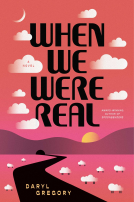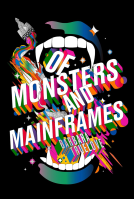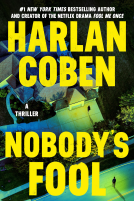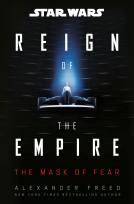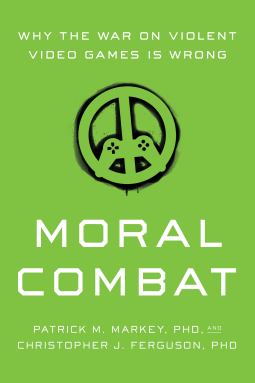
Moral Combat
Why the War on Violent Video Games Is Wrong
by Patrick M. Markey; Christopher J. Ferguson
This title was previously available on NetGalley and is now archived.
Send NetGalley books directly to your Kindle or Kindle app
1
To read on a Kindle or Kindle app, please add kindle@netgalley.com as an approved email address to receive files in your Amazon account. Click here for step-by-step instructions.
2
Also find your Kindle email address within your Amazon account, and enter it here.
Pub Date Mar 21 2017 | Archive Date May 04 2017
Description
In what sometimes seems like an increasingly violent world, it’s only natural to worry about the effects of all this pixelated gore. But is that concern misplaced? Authors and psychologists Patrick M. Markey and Christopher J. Ferguson say it is.
The media and politicians have been sounding the alarm for years, and with every fresh tragedy involving a young perpetrator comes another flurry of articles about the dangers of violent media. The problem is this: Their fear isn’t supported by the evidence. In fact, unlike the video game–trained murder machines depicted in the press, school shooters are actually less likely to be interested in violent games than their peers. In reality, most well-adjusted children and teenagers play violent video games, all without ever exhibiting violent behavior in real life. What’s more, spikes in sales of violent games actually correspond to decreased rates of violent crime.
If that surprises you, you’re not alone—the national dialogue on games and violence has been hopelessly biased. But that’s beginning to change. Scholars are finding that not only are violent games not one of society’s great evils, they may even be a force for good.
In Moral Combat, Markey and Ferguson explore how video games—even the bloodiest—can have a positive impact on everything from social skills to stress, and may even make us more morally sensitive. Tracing the rise of violent games from arcades to online deathmatches, they have spent years on the front lines of the video game debate and now offer a comprehensive overview of the scientific research on gaming. With humor, complete honesty, and extensive research, they separate the myth from the medium.
Moral Combat is an irreverent and informative guide to the worries—and wonders—of our violent virtual world.
A Note From the Publisher
Additionally, if you are interested in learning more about this book and/or interviewing the authors for a podcast, website, or news article, please contact Lindsay@BenBellaBooks.com.
Happy reading!
Advance Praise
“A fact-filled, persuasive, and witty debunking of the cyclical moral panic about video games.” —Steven Pinker, professor of psychology at Harvard University and author of How the Mind Works and The Better Angels of Our Nature
“A groundbreaking and vitally important book. It gets under the hood of how games actually work on our brains, and in the process it tells us more than any number of sensational news articles. This should be required reading for anyone who loves games or who loves someone who loves games . . . which is to say, everyone.” —Greg Toppo, author of The Game Believes in You: How Digital Play Can Make Our Kids Smarter
“As a filmmaker who's spent much of my career working on video game-related content, it's refreshing to finally see a book about games that gets it right.” —Jeremy Snead, founder of Mediajuice Studios and writer/director of Video Games: The Movie and Unlocked: The World of Games, Revealed
“Even readers familiar with video game politics and history will find something to gasp about. And stressed parents may finally understand what their kids get out of those games, and how to manage them better.”—Cheryl K. Olson, ScD, coauthor of Grand Theft Childhood: The Surprising Truth About Violent Video Games and What Parents Can Do and principal investigator for a major government-funded study of video games and youth
“Gamers should buy this book for their parents, and parents should calm down teachers and pediatricians with a copy. Anyone interested in a great, skeptical takedown of bad science should get their own copy.”—James C. Coyne, professor emeritus of psychology and psychiatry at the University of Pennsylvania
“This book delivers healthy doses of skepticism and scientific insights that broaden our understanding of 21st century play. From political horse-trading to weak science, this book is a must-read for anyone interested in video games.” —Andrew Przybylski, PhD, experimental psychology department research fellow at the University of Oxford
Available Editions
| EDITION | Other Format |
| ISBN | 9781942952985 |
| PRICE | $16.95 (USD) |
| PAGES | 320 |
Featured Reviews
Do violent video games lead kids to be more violent in real life? This was a huge debate amongst homeschoolers five-ten years ago. I’m not as involved in the day to day discussions of that subgroup anymore, but I feel like there are plenty of people who still believe that they do. So much research went into the writing of this book that I hope that it does get the audience it deserves.
Here is my standard video game Disclaimer: We are an unabashed video game enthusiast family. We own quite a few consoles and even collect what are now “antique” systems so in some ways I felt like with me the author was preaching to the choir a bit.
Tracing the world of video games from its start where in the early days Atari broke its rule about violence against humans by introducing Cops N Robbers and Roaring Twenties both of which included gun violence. That said: ” It is hard to create a horrifying and realistic violence image in the blocky 160×192 resolution of an Atari 2600.”
Nowadays we all know that that anything pictured in a video game will be both realistic and graphic whether it is violent or not. Through extensive research, we also know that games can have a positive impact on everything from social skills to stress, and may even make us more morally sensitive. The authors have spent years on the front lines of the video game debate and now offer a comprehensive overview of the scientific research on gaming. I found this to be a balanced look that separates the myths from the investigation.
I read a DRC of this book courtesy of NetGalley in exchange for an honest review.
Readers who liked this book also liked:
John Kotter; Holger Rathgeber
Business, Leadership, Finance, Nonfiction (Adult)

